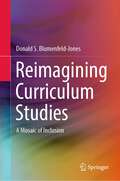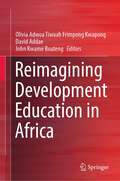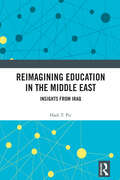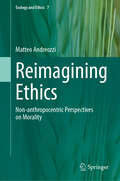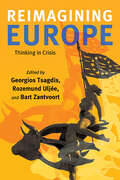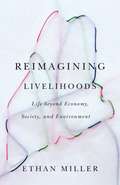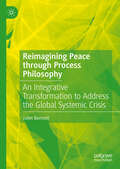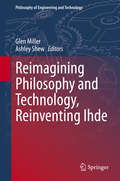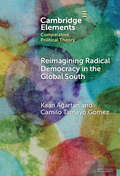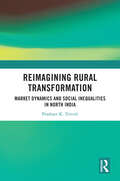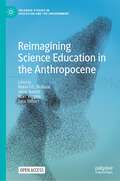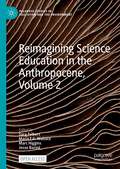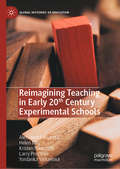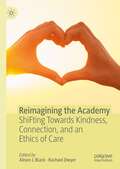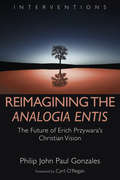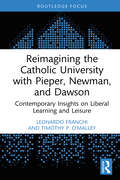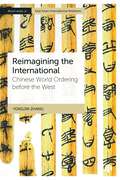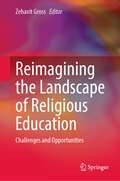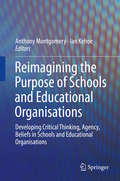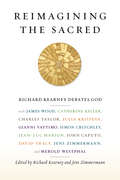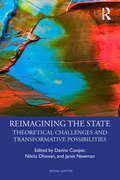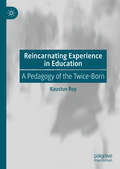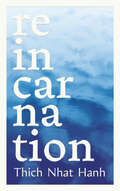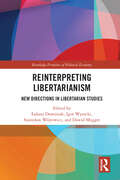- Table View
- List View
Reimagining Curriculum Studies: A Mosaic of Inclusion
by Donald S. Blumenfeld-JonesThis book addresses the crucial issue of how we value and deploy the idea of “freedom” that underlies contemporary curriculum studies. Whether we are conventional curriculum thinkers who value knowledge development or favor a Deweyan, individualist orientation toward curriculum or are a critical social justice curriculum thinker, at the heart of all these orientations and theorizing is the value of “freedom.” The book addresses “freedom” through novel sources: the work of Martin Buber on education, Julia Kristeva on the uses of imagination and the female/male dialectic, Emmanuel Levinas’ unique approach to ethics, and more. Readers will find new ways to understand freedom and the world of ethical life as informing curriculum thinking. It provides a more ecumenical vision that can draw our differences together. It helps readers to reconsider ourselves in fruitful ways that can bring more relevance and substance to the field.
Reimagining Development Education in Africa
by Olivia Adwoa Tiwaah Frimpong Kwapong David Addae John Kwame BoatengThis edited volume uses an African-centred approach to examine a renewed vision of development education in Africa. The purpose of the volume is to supplant prevailing Western ideologies, traditions, and rhetoric in the development education discourse in Africa and to advocate for alternative paradigms, knowledges, beliefs, and practices through the effort of dialogue between competing orientations, values and experiences. The book argues that Africa's development challenges are uniquely African requiring indigenous African solutions. Consequently, this book offers an insightful collection of case studies and conceptual papers that examine how indigenous African knowledge, philosophies, traditions, beliefs, and values shape the theory and practice of development education in Africa. Reimagining Development Education in Africa exemplifies an interdisciplinary and multifaceted scholarship, addressing topical issues and advances in development education in Africa. The book discusses among other topics, Ubuntu-inspired education for sustainable development, decolonising African development education, Afrocentricity, Globalisation, and gender equality. This book is a must read for scholars and students interested in understanding indigenous educational efforts aimed at promoting sustained improvements in the quality of life of African peoples.
Reimagining Education in the Middle East: Insights from Iraq
by Hadi T. PirThis book critically examines significant educational challenges in the broader Middle East, using insights from Iraq to explore historical, political, social, racial, religious, linguistic, and sectarian influences on education. It introduces new theoretical perspectives to explain why ineffective educational policies have persisted for the past century and proposes alternative approaches for research and policymaking in the region.Utilizing grounded theory methodology, the book includes interviews with 20 prominent Iraqi educational policymakers to reveal a shared worldview—termed the Traditional Paradigm—that continues to influence education and policy. It critiques dominant Western paradigms of critical theory and postmodernism for their inability to capture the complexities of the Middle East. Additionally, it introduces the Established Reality Theory, which draws on cognitive psychology and sociology to explain why ineffective policies persist despite shifts in regime. The book provides new insights, policy recommendations, and avenues for research to assist scholars and policymakers in tackling significant educational challenges.The book is relevant to scholars, researchers, and students in education, Middle Eastern studies, sociology, and political science. It is also valuable for policymakers, educators, and institutions seeking a deeper understanding of educational structures and reform in the Middle East.
Reimagining Ethics: Non-anthropocentric Perspectives on Morality (Ecology and Ethics #7)
by Matteo AndreozziSeveral environmental problems are currently seriously undermining the traditional belief that the moral community should be restricted to human beings only. New scientific theories, especially in the fields of biology, ethology, and ecology, together with recent scientific discoveries demonstrating how human activities are jeopardizing ecosystem services urge for a paradigmatic change in our moral convictions. Environmental ethics has taken up the challenge and opened an extremely urgent and inspiring call for philosophical research. This is the call for extending the moral community to non-human and non-paradigmatic entities, regarding them as moral patients. The main aim of this book is to analyze the possibility and the legitimacy of a non-anthropocentric environmental ethic. In pursuing this aim, I primarily demonstrate the possibility and need to extend the status of moral patient beyond the ideal paradigmatic human being. I also provide an original categorization of several theoretical projects that have been proposed in the last few decades. Secondly, this book comprises a constructive critique of the most significant moral theories debated in the field and outlines a personal theoretical proposal for a new environmental ethic. My claim is that the refusal of ethical and ontological supremacy of human beings is not only necessary, but also sufficient to set the foundation for a formally and materially valid ethical system. Even without abandoning the most accepted forms of moral epistemology, it is nonetheless possible to admit the need to respect different kinds of non-human and non-paradigmatic moral patients.
Reimagining Europe: Thinking in Crisis (SUNY series in Contemporary French Thought)
by Georgios Tsagdis; Rozemund Uljée; Bart ZantvoortReimagining Europe comprises a series of contributions which address, in various ways, the relationship between Europe and continental philosophy/phenomenology. Europe is in crisis: a crisis that no longer designates a moment of decision, a critical point between a before and an after, but a state, a permanent mode of being, a constant emergency. At this juncture of Europe, the aporia of language confronts the aporia of history. We cannot speak, we must speak, we shall speak. As such, the contributions all engage with the idea that the question "what is Europe?" must measure up a series of questions, namely: what was it to be? What does it mean to initiate and sustain a project, such as Europe, if only at times, after the fact? The questions of internal and external borders, of homogeneity and coherence, identity and equality, legitimacy and rights, democracy and representation can only be raised insofar as the question of Europe, its destiny, and destination, is raised as a whole.
Reimagining Livelihoods: Life beyond Economy, Society, and Environment (Diverse Economies and Livable Worlds)
by Ethan MillerA provocative reassessment of the concepts underlying the struggle for sustainable developmentMuch of the debate over sustainable development revolves around how to balance the competing demands of economic development, social well-being, and environmental protection. &“Jobs vs. environment&” is only one of the many forms that such struggles take. But what if the very terms of this debate are part of the problem? Reimagining Livelihoods argues that the &“hegemonic trio&” of economy, society, and environment not only fails to describe the actual world around us but poses a tremendous obstacle to enacting a truly sustainable future.In a rich blend of ethnography and theory, Reimagining Livelihoods engages with questions of development in the state of Maine to trace the dangerous effects of contemporary stories that simplify and domesticate conflict. As in so many other places around the world, the trio of economy, society, and environment in Maine produces a particular space of &“common sense&” within which struggles over life and livelihood unfold. Yet the terms of engagement embodied by this trio are neither innocent nor inevitable. It is a contingent, historically produced configuration, born from the throes of capitalist industrialism and colonialism. Drawing in part on his own participation in the struggle over the Plum Creek Corporation&’s &“concept plan&” for a major resort development on the shores of Moosehead Lake in northern Maine, Ethan Miller articulates a rich framework for engaging with the ethical and political challenges of building ecological livelihoods among diverse human and nonhuman communities. In seeking a pathway for transformative thought that is both critical and affirmative, Reimagining Livelihoods provides new frames of reference for living together on an increasingly volatile Earth.
Reimagining Peace through Process Philosophy: An Integrative Transformation to Address the Global Systemic Crisis
by Juliet BennettThis book explores the ways in which process philosophers extend and strengthen peace scholars’ outlines of a paradigm of/for peace. It then illustrates the value of such a peace paradigm through the example of the climate breakdown, showing how process thinking and process metaphysics intervene at the roots of a global systemic crisis. In doing so, it articulates a new inroad to process philosophy, and illuminates an integrative intervention in the systemic crises of climate change and global inequality. The “static-process framework” developed in this book makes the philosophy of Alfred North Whitehead and the fields he has inspired easier to grasp, and offers a tool to assist in the application of process thought to a multitude of issues. This framework depicts tensions between two modes of thought—static and process thinking—according to five “basic orientations”: abstract/context, closed/open, isolating/relational; passive/generative; one/multi-dimensional. This pattern is mapped across the domains of metaphysics, economics, politics and as the basis for a new mode of living and organising across multiple layers of society.
Reimagining Philosophy and Technology, Reinventing Ihde (Philosophy of Engineering and Technology #33)
by Ashley Shew Glen MillerThis volume includes eleven original essays that explore and expand on the work of Don Ihde, bookended by two chapters by Ihde himself. Ihde, the recipient of the first Society for Philosophy and Technology's Lifetime Achievement Award in 2017, is best known for his development of postphenomenology, a blend of pragmatism and phenomenology that incorporates insights into the ways technology mediates human perception and action.The book contains contributions from academics from Europe, North America, and Asia, which demonstrates the global impact of Ihde’s work. Essays in the book explore the relationship between Ihde's work and its origins in phenomenology (especially Husserl and Heidegger) and American pragmatism; integrate his philosophical work within the embodied experience of radical architecture and imagine the possibility of a future philosophy of technology after postphenomenology;develop central ideas of postphenomenology and expand the resources present in postphenomenology to ethics and politics; andextend the influence of Ihde's ideas to mobile media and engineering, and comprehensively assess the influence of his work in China. The book includes a reprint of the Introduction of Sense and Significance, one of Ihde's first books; "Hawk: Predatory Vision," a new chapter that blends his biographical experience with feminism, technoscience, and environmental observation; and an appendix that lists all of Ihde's books as well as secondary sources annotated by Ihde himself. Starting with an Editors' Introduction that offers an overview of the central ideas in Ihde's corpus and concluding with an index that facilitates research across the various chapters, this book is of interest to a diverse academic community that includes philosophers, STM scholars, anthropologists, historians, and sociologists.
Reimagining Radical Democracy in the Global South: Emerging Paradigms from Colombia and Türkiye (Elements in Comparative Political Theory)
by Kaan Ağartan Camilo Tamayo GomezRadical democracy informs contemporary social movements both as critique of existing liberal democratic social orders and as inspiration for collective action to challenge power structures. However, existing approaches on the relationship between radical democracy and social movements often truncate complex socio-political issues, constraining political imagination and stifling 'truly radical' alternatives. This Element offers an analysis of contemporary social movements in Colombia and Turkey to show the limits and potential of radical democracy to reimagine new expressions of citizenship and non-capitalist alternatives. It argues that there is a mismatch between the radical democratic paradigm as it is formulated within Eurocentric purview, and the ways it has been articulated and practised by anti-austerity and pro-democracy movements of the twenty-first century. We propose that radical democracy should be rethought in light of novel forms of political activism and visions emerging from these social movements as a response to the failures of liberal democracy.
Reimagining Rural Transformation: Market Dynamics and Social Inequalities in North India
by Prashant K TrivediThis book examines the effects of the pattern of growing integration between the rural and urban economies in India. Drawing on in-depth surveys conducted in villages in north India, it examines the rural agricultural economy's transformation, productivity, technology deployment, and social relations over a period of seven years. The book focuses on the socially embedded nature of the dynamics of transformation, weaving analysis around the axis of land, caste, and gender. It also identifies policy gaps and recommends steps for a sustainable and inclusive rural transformation in the Global South.An important contribution to the study of India’s economic and social landscape, this book will be useful for scholars of agriculture, sociology, economics, political science, development studies, and South Asian studies. It will also be of interest to policymakers and journalists interested in rural development, migration, employment, agriculture, and demography.
Reimagining Science Education in the Anthropocene (Palgrave Studies in Education and the Environment)
by Jesse Bazzul Marc Higgins Maria F. G. Wallace Sara TolbertThis open access edited volume invites transdisciplinary scholars to re-vision science education in the era of the Anthropocene. The collection assembles the works of educators from many walks of life and areas of practice together to help reorient science education toward the problems and peculiarities associated with the geologic times many call the Anthropocene. It has become evident that science education—the way it is currently institutionalized in various forms of school science, government policy, classroom practice, educational research, and public/private research laboratories—is ill-equipped and ill-conceived to deal with the expansive and urgent contexts of the Anthropocene. Paying homage to myopic knowledge systems, rigid state education directives, and academic-professional communities intent on reproducing the same practices, knowledges, and relationships that have endangered our shared world and shared presents/presence is misdirected. This volume brings together diverse scholars to reimagine the field in times of precarity.
Reimagining Science Education in the Anthropocene, Volume 2 (Palgrave Studies in Education and the Environment)
by Jesse Bazzul Marc Higgins Maria F. G. Wallace Sara TolbertThis volume, a follow up to Reimagining Science Education in the Anthropocene (2021), continues a transdisciplinary conversation around reconceptualizing science education in the era of the Anthropocene. Drawing educators from many walks of life and areas of practice together in a creative work that helps reorient science education toward the problems and peculiarities associated with this contemporary geologic time. This work continues the mission of transforming the ways communities inherit science and technology education: its knowledges, practices, policies, and ways-of-living-with-Nature. Our understanding of the Anthropocene is necessarily open and pluralistic, as different beings on our planet experience this time of crisis in different ways. This second volume continues to nurture productive relationships between science education and fields such as science studies, environmental studies, philosophy, the natural sciences, Indigenous studies, and critical theory in order to provoke a science education that actively seeks to remake our shared ecological and social spaces in the coming decades and centuries. This is an open access book.
Reimagining Teaching in Early 20th Century Experimental Schools (Global Histories of Education)
by Larry Prochner Kristen Nawrotzki Helen May Yordanka Valkanova Alessandra Arce HaiThis book considers the diffusion and transfer of educational ideas through local and transcontinental networks within and across five socio-political spaces. The authors examine the social, political, and historical preconditions for the transfer of “new education” theory and practices in each period, place, and school, along with the networks of ideas and experts that supported this. The authors use historical methods to examine the schools and to pursue the story of the circulation of new ideas in education. In particular, chapters investigate how educational ideas develop within contexts, travel across boundaries, and are adapted in new contexts.
Reimagining the Academy: ShiFting Towards Kindness, Connection, and an Ethics of Care
by Rachael Dwyer Alison L BlackThis book explores the capacities and desires of academic women to reimagine and transform academic cultures. Embracing and championing feminist scholarship, the research presented by the authors in this collection holds space for a different way of being in academia and shifts the conversation toward a future that is hopeful, kind and inclusive. Through exploring lived experiences, building caring communities and enacting an ethics of care, the authors are reimagining the academy’s focus and purpose. The autoethnographic and arts-based research approaches employed throughout the book provide evocative conceptual content, which responds to the symbolic nature of transformation in the academy. This innovative volume will be of interest and value to feminist scholars, as well as those interested in disrupting and rejecting patriarchal academic structures.
Reimagining the Analogia Entis: The Future of Erich Przywara's Christian Vision (Interventions)
by Philip John Gonzales Cyril O'ReganIn 1932 German theologian and philosopher Erich Przywara penned his Analogia Entis, a vision of the analogy of being and a metaphysical exploration of the dynamic between God and creation. A translation into English in 2014 made Przywara’s brilliant and influential work available to more people than ever before. In this book Philip Gonzales calls English-speaking readers to embrace the Christian treasure of the Analogia Entis and to reimagine what it offers Christians today. Gonzales brings Przywara’s text into dialogue with debates in contemporary philosophy and theology, engaging in conversation with Edith Stein, Karl Barth, Martin Heidegger, the Nouvelle théologie, Vatican II, and leading figures in postmodern theology and the Continental turn to religion. The first book of its kind in English, Reimagining the “Analogia Entis” articulates a Christian vision of being for the postmodern era.
Reimagining the Analogia Entis: The Future of Erich Przywara's Christian Vision (Interventions)
by Philip John Paul GonzalesIn 1932 German theologian and philosopher Erich Przywara penned his Analogia Entis, a vision of the analogy of being and a metaphysical exploration of the dynamic between God and creation. A translation into English in 2014 made Przywara&’s brilliant and influential work available to more people than ever before. In this book Philip Gonzales calls English-speaking readers to embrace the Christian treasure of the Analogia Entis and to reimagine what it offers Christians today. Gonzales brings Przywara&’s text into dialogue with debates in contemporary philosophy and theology, engaging in conversation with Edith Stein, Karl Barth, Martin Heidegger, the Nouvelle théologie, Vatican II, and leading figures in postmodern theology and the Continental turn to religion. The first book of its kind in English, Reimagining the &“Analogia Entis&” articulates a Christian vision of being for the postmodern era.
Reimagining the Catholic University with Pieper, Newman, and Dawson: Contemporary Insights on Liberal Learning and Leisure
by Leonardo Franchi Timothy P. O’MalleyThis compact volume argues compellingly for a classical understanding of leisure within the context of Catholic universities and explores how a critically nuanced reading of the work of philosopher Josef Pieper, theologian St John Henry Newman, and cultural historian Christopher Dawson can reframe debates over the nature of Catholic universities.Chapters facilitate a refreshed understanding of how leisure, as proposed by Pieper, potentially promotes a liberal, humanistic vision of the Catholic university as a site of integral human development. In so doing, the book fundamentally questions and re-evaluates the purpose of a university, reframing the idea of what it constitutes both in theory and practice. This approach enables institutions to remain open to diverse intellectual traditions while confidently drawing upon their own rich heritage to create genuinely hospitable academic communities. Ultimately, the book offers a vision for reforming Catholic higher education that challenges the increasingly utilitarian and market-driven models dominating contemporary university life.Grounded in solid historical foundations while offering innovative thinking around Catholic university reform, the book will be of interest to scholars, researchers and postgraduate students with an interest in Catholicism and the philosophy of education. Those more broadly interested in exploring the intersection between education, philosophy, and religion will also find the volume of use.
Reimagining the International: Chinese World Ordering before the West (Bristol Studies in East Asian International Relations)
by Yongjin ZhangA rich and enlightening study of Chinese international relations, this book examines Chinese world ordering before the West as both intellectual history and institutional practices in deep world history. It shows how engaging China’s historical pursuit of ordering the world can contribute to our search for global foundations of international thought. Offering a distinctive English School perspective, this volume is a call to put studies of Chinese international relations in their proper historical context. It argues that such an approach leads to a better understanding of Chinese ideas and statecraft and contends that reimagining the international is indispensable for a fruitful pursuit of knowledge production in the construction of global IR.
Reimagining the Landscape of Religious Education: Challenges and Opportunities
by Zehavit GrossThis book brings together new thinking and research on religious education’s complex and evolving role in the multicultural, diverse postmodern era. It facilitates new realism and understanding of the current situation from empirical and reflective accounts relating to a variety of countries and political contexts, as well as providing innovative methodological approaches to the study of education and religion.In different contexts around the world, at different levels of education, and from different theoretical lenses, religious education occupies a contested space. The ongoing, changing nature of the world due to increasing secularization, rapid technological change, mass immigration, globalization processes, conflict and challenging security issues, from inter to intra state levels, and with shifting geopolitical power balances, generates the need to reconceptualize where religious education is positioned. It claims that religious education on its own can be an agent of moral, social and spiritual transformation are disputed. There is significant controversy about whether special religious education, that is in-faith education, still has a role within the post-modern world.
Reimagining the Purpose of Schools and Educational Organisations
by Anthony Montgomery Ian KehoeThis book features a diverse set of perspectives all focused towards questioning the role schools actually play in society and, more importantly, the role they could potentially play. Containing papers presented at the 1st International Conference on Reimagining Schooling which took place in Thessaloniki, Greece, June 2013, bringing together international and multi-disciplinary perspectives on the future of education and schools. Combines diverse specialties analyzing schools as organizations and questions the purpose of schools. The book explores the current purpose of schooling and debates what roles and values young people currently learn from schooling. It examines such issues as the impact of Neoliberalism, the pursuit of the socially just school, and imagining contemporary schools beyond their consumerist mentality. Tackling development in the growing economic and social crisis in Europe, and offering transformative analysis of the psychology and decision-making involved for innovating teaching, learning, socio-economic and policy contexts. In addition, the book shows different ways young people can be creatively involved in reimagining schooling. It also details both innovative and radical ideas that currently exist about school transformation such as building learning partnerships for all and creating synergies across formal and informal settings of learning. Raising important questions for the future of the relationship between teacher and pupil and positive and pro-active behavior. There is a growing realization that schools fail to accommodate diverse types of learning and that their purpose is not simply about education. Featuring academics and practitioners from many different disciplines, this book boldly questions the values that currently permeate school walls and suggests ways that schooling itself can be made better.
Reimagining the Sacred: Richard Kearney Debates God with James Wood, Catherine Keller, Charles Taylor, Julia Kristeva, Gianni Vattimo, Simon Critchley, Jean-Luc Marion, John Caputo, David Tracy, Jens Zimmermann, and Merold Westphal (Insurrections: Critical Studies in Religion, Politics, and Culture)
by Richard Kearney Jens ZimmermannContemporary conversations about religion and culture are framed by two reductive definitions of secularity. In one, multiple faiths and nonfaiths coexist free from a dominant belief in God. In the other, we deny the sacred altogether and exclude religion from rational thought and behavior. But is there a third way for those who wish to rediscover the sacred in a skeptical society? What kind of faith, if any, can be proclaimed after the ravages of the Holocaust and the many religion-based terrors since?Richard Kearney explores these questions with a host of philosophers known for their inclusive, forward-thinking work on the intersection of secularism, politics, and religion. An interreligious dialogue that refuses to paper over religious difference, these conversations locate the sacred within secular society and affirm a positive role for religion in human reflection and action. Drawing on his own philosophical formulations, literary analysis, and personal interreligious experiences, Kearney develops through these engagements a basic gesture of hospitality for approaching the question of God. His work facilitates a fresh encounter with our best-known voices in continental philosophy and their views on issues of importance to all spiritually minded individuals and skeptics: how to reconcile God's goodness with human evil, how to believe in both God and natural science, how to talk about God without indulging in fundamentalist rhetoric, and how to balance God's sovereignty with God's love.
Reimagining the State: Theoretical Challenges and Transformative Possibilities (Social Justice)
by Janet Newman Davina Cooper Nikita DhawanThis book examines what value, if any, the state has for the pursuit of progressive politics; and how it might need to be reimagined and remade to deliver transformative change. Is it possible to reimagine the state in ways that open up projects of political transformation? This interdisciplinary collection provides alternative perspectives to the ‘antistatism’ of much critical writing and contemporary political movement activism. Contributors explore ways of reimagining the state that attend critically to the capitalist, neoliberal, gendered and racist conditions of contemporary polities, yet seek to hold onto the state in the process. Drawing on postcolonial, poststructuralist, feminist, queer, Marxist and anarchist thinking, they consider how states might be reread and reclaimed for radical politics. At the heart of this book is state plasticity – the capacity of the state conceptually and materially to take different forms. This plasticity is central to transformational thinking and practice, and to the conditions and labour that allow it to take place. But what can reimagining do; and what difficulties does it confront? This book will appeal to academics and research students concerned with critical and transformative approaches to state theory, particularly in governance studies, politics and political theory, socio-legal studies, international relations, geography, gender/sexuality, cultural studies and anthropology.
Reincarnating Experience in Education: A Pedagogy of the Twice-Born
by Kaustuv RoyThis book presents authentic educational experience as the actualization of a potential within a phenomenological field whose axes consist of the somatic, the psychic, and the symbolic, thereby rejecting the one-dimensionality of contemporary education that is primarily mind-oriented. The author insists on the nature of experiencing as coming to be in a living tension between the intuition and the intellect, or the inner and the outer, and calls this a pedagogy of the twice-born. Within this pedagogy, the truly educated must be born twice: in the first instance, involuntarily thrust into a commonsensical world, and in the second, taking a deliberate step toward a qualitative principle. The latter gives us ontological hope or a sense of autonomy and self-sufficiency.
Reincarnation (Zen Doors)
by Thich Nhat Hanh Phap LuuEvery moment is a moment of rebirth.In this profound short book, Thich Nhat Hanh offers clear, accessible reflections on the nature of reincarnation—which he calls &“continuation.&” Our thoughts, speech, and actions are our true continuation. Shaped by how we live and what we consume, they carry us forward into the future—far beyond the boundaries of this body.When we release the illusion of a separate self, we open the door to a liberating insight: rebirth is not somewhere else, someday later. It is happening now, in every moment.
Reinterpreting Libertarianism: New Directions in Libertarian Studies (Routledge Frontiers of Political Economy)
by Dawid Megger Łukasz Dominiak Igor Wysocki Stanisław WójtowiczThis volume provides a thorough reconsideration of libertarian theory, offering novel perspectives that challenge established assumptions and initiate new directions for philosophical, legal and economic investigation.By tackling such topics as voluntariness, dignity and inalienability of rights, game theory, healthcare, and the political relevance of monarchy, the chapters provide readers with novel analytical instruments for delving more deeply into libertarianism. Through detailed examinations of such issues as fraud, blackmail, slavery, liability, and technological disruption, contributors reconsider the foundations of libertarian principles while demonstrating how they apply to pressing contemporary practical problems. The book offers critical reassessments of established doctrines and constructive proposals for reformulating libertarianism, while trying to remedy its theoretical weaknesses. In doing so, it furnishes its readers with a framework that helps to understand both the theoretical coherence and the practical adaptability of libertarian ideas, ensuring its relevance for philosophers, legal theorists, economists, and policymakers alike.The book will be of great interest to political economists, political philosophers, political scientists, ethicists, and everyone in libertarianism in all its forms.
